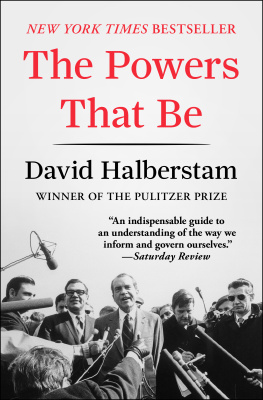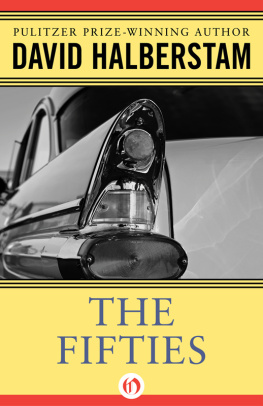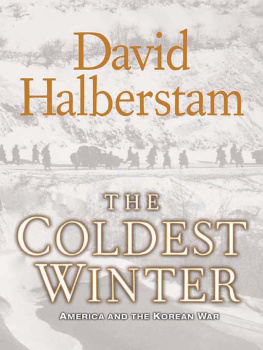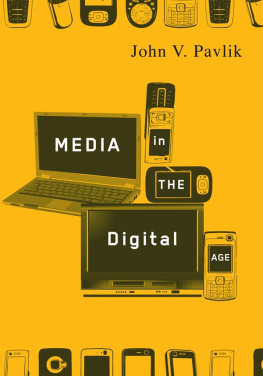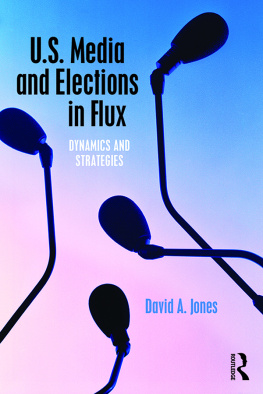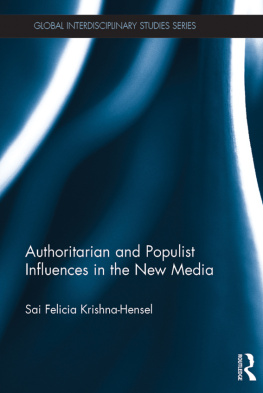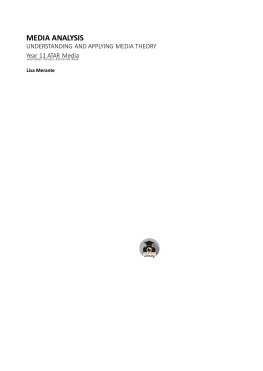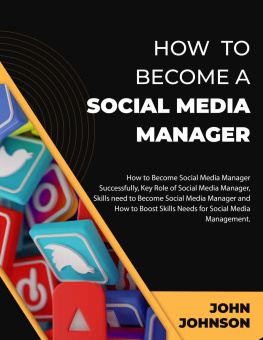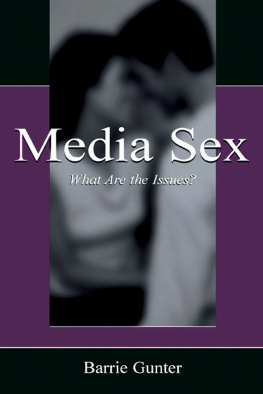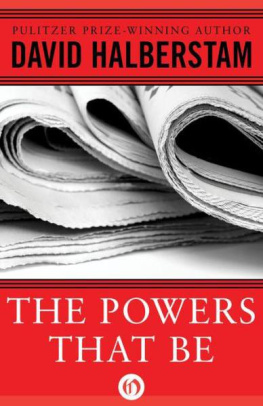David Halberstam - The Powers That Be
Here you can read online David Halberstam - The Powers That Be full text of the book (entire story) in english for free. Download pdf and epub, get meaning, cover and reviews about this ebook. year: 2000, publisher: University of Illinois Press, genre: Non-fiction / History. Description of the work, (preface) as well as reviews are available. Best literature library LitArk.com created for fans of good reading and offers a wide selection of genres:
Romance novel
Science fiction
Adventure
Detective
Science
History
Home and family
Prose
Art
Politics
Computer
Non-fiction
Religion
Business
Children
Humor
Choose a favorite category and find really read worthwhile books. Enjoy immersion in the world of imagination, feel the emotions of the characters or learn something new for yourself, make an fascinating discovery.
- Book:The Powers That Be
- Author:
- Publisher:University of Illinois Press
- Genre:
- Year:2000
- Rating:4 / 5
- Favourites:Add to favourites
- Your mark:
- 80
- 1
- 2
- 3
- 4
- 5
The Powers That Be: summary, description and annotation
We offer to read an annotation, description, summary or preface (depends on what the author of the book "The Powers That Be" wrote himself). If you haven't found the necessary information about the book — write in the comments, we will try to find it.
The Powers That Be — read online for free the complete book (whole text) full work
Below is the text of the book, divided by pages. System saving the place of the last page read, allows you to conveniently read the book "The Powers That Be" online for free, without having to search again every time where you left off. Put a bookmark, and you can go to the page where you finished reading at any time.
Font size:
Interval:
Bookmark:


ON SEPTEMBER 10, 1960, Samuel Taliaferro Rayburn arrived somewhat early in El Paso, Texas, for a Democratic Party rally. The particular rally featured Rayburns personal protg, Lyndon Johnson, the Democratic candidate for Vice-President, and the young man about whom Rayburn had considerable personal misgiving, John F. Kennedy, the presidential nominee. Rayburn at the time was seventy-eight years old and in his sixteenth year as Speaker of the House of Representatives. His health was already slipping, he was in fact dying of cancer, though he did not yet know it. He had not been feeling well in recent months but he steadfastly refused to see a doctor. He had a rural suspicion of doctors in general and, in addition, he feared that any report that he had even seen a doctor might quickly spread through the House and spur rumors of his declining health and thus weaken his mandate and inspire challenges to his rule. At the time he thought he was suffering from no more than a severe back problem. In addition, his eyesight was fast failing, he could no longer read, and this too was a closely guarded secret; only his most trusted associates were allowed to read to him in the privacy of his own chambers. Those around Rayburn who cared deeply for him realized that as his body failed his political control was probably ebbing as well; more, that he had probably stayed on as Speaker too long, that he was living off his past reputation and strength, and that it was only a matter of time before Sam Rayburn had to give up what he prized above all else, the Speakership of the House. (Once, a few years earlier, traveling back from a Sunday picnic with his good friends Lyndon and Lady Bird Johnson, he had pointed to the Capitol Dome as they first saw the Washington skyline and he had said, Lady Bird, how do you like my building? saying it modestly, more as a matter of love than of ego; this was what he had done with a half century of his life, this and nothing more.)
On that day in El Paso while waiting for Kennedy and Johnson to arrive, however, he was restless, he had a half day on his hands and precious little to do, and so he turned to the people with him and said that he wanted to go over and see Mexico, would that be all right? Are you sure? one of them asked, feeling the trip might be a strain, but he said yes, he had a notion to go over there to see Mexico. Which was unusual, for though Sam Rayburn had helped marshal the Congress of the United States to play its role as this nation sprang to world-power status, he had never been interested in foreign travel or the world outside. He had hated junkets and mocked those members who regularly went on junkets. To his mind, the rest of the world was outside his realm of competence, he did not need to travel to see it. He accepted what the President said the world was like, since the President knew more about these things and the President of the United States would have no need to lie. The world outside, he believed as an act of faith, did not relate to domestic politics. He had, for the record, as a young congressman, once visited the Panama Canal, and it was also believed, though this was in question, that he had once attended dedication ceremonies of some sort in Mexico many years earlier. So, depending on the count, this wasafter forty-eight years of national service, many of them at the most crucial and sensitive levelthis was to be either his second or third trip outside the United States. With him that day as guides were the El Paso congressman J. T. (Slick) Rutherford; his assistant, Larry L. King, later to be a nationally known writer; and one of Rayburns nephews, then stationed at Fort Bliss. So they drove over to Juarez, and there the old man sat and stared, his eyes fixed on the wonders of Juarez, until finally it was time to go back. At which point they turned the huge car around and headed back across the Rio Grande, and as they crossed the river and reached the checkpoint, the American immigration officer waved them to a halt and asked them to declare their nationality. Rayburn, who was also becoming hard of hearing, could not hear the guard, and so the guard yelled, a little more angrily this time. After all, he was simply dealing with another very bald man. Declare your nationality, he shouted, and there was again a pause, and this time the guard shouted again, not unlike a drill instructor, and this time the Speaker answered back, not his nationality, but his identity, Sam Rayburn! Sam Rayburn! and he yelled it with the same ferocity that he had used in gaveling down countless demonstrations at countless Democratic conventions, and it was like a gavel flashing in the El Paso air, and the officer looked and there was a flash of recognition and a flash of fear, and he quickly waved the car through. So they drove back over the Rio Grande and into El Paso and drove through that city, and finally Rayburn, who had been very silent, turned to Rutherford and King and said, Well, it looks pretty much like I thought it would, and suddenly King realized that the old man still thought he was in Juarez.
He seemed in a somewhat grumpy and sour mood in the car, but that was not surprising, he had been that way on and off for several weeks. He was still bothered by the forthcoming election campaign. Everyone knew he hated Nixon, he had never made any secret of that, Rayburn was a man of the party and of old-fashioned loyalties and he believed that Nixon had slandered the Democratic Party and some of his friends. But Rayburn was still wary of Kennedy, he had not completely accepted him as a man of presidential stature. Kennedy represented much of what he was coming to distrust in politics. Jack Kennedy had served under Rayburn in the House, but he had not been a particularly diligent member; he had stayed around only long enough to run for the Senate, and when he had been elected to the Senate, he had used that body primarily as a base from which he could run for the presidency. Rayburn disliked this, it was a sign of the younger mans fierce ambition. Worse, Kennedy was someone who was closer to many journalists than he was to most of his colleagues in the Senate.
Sam Rayburn, that year, had of course been for Lyndon, but Lyndon was a reluctant and petulant presidential candidate; his grand design called for everyone else to take a risk and stop Kennedy in the primaries while he stood on the sidelines. Rayburn and others had pushed for Lyndon to run a more active campaign, they had in fact put together a campaign complete with an opening announcement, and then, at the last minute, Johnson had reneged. Rayburn, furious, had turned to Horace Busby, Johnsons speech writer, and had asked, plaintive and exhausted, Why is Lyndon always like this? Johnsons campaign had, of course, failed, since it was never a campaign, and Rayburn had hated the way that Kennedy forces had controlled the convention in Los Angeles. They seemed to be cold and merciless young men. He was still uneasy about the idea of a Catholic running for the presidency, the South that he knew had too much racial and religious hatred and he was afraid that Kennedys candidacy would simply stir things up. When Kennedy had first offered the vice-presidency to Johnson, Rayburn had been one of those most opposed to the idea. But then overnight he had changed his, mind and he had told Lyndon to take it, not out of love for Jack Kennedy but out of hatred for Richard Nixon. He had told Lyndon the ticket could win only if he was on it, and it was imperative that Nixon not be President.
Font size:
Interval:
Bookmark:
Similar books «The Powers That Be»
Look at similar books to The Powers That Be. We have selected literature similar in name and meaning in the hope of providing readers with more options to find new, interesting, not yet read works.
Discussion, reviews of the book The Powers That Be and just readers' own opinions. Leave your comments, write what you think about the work, its meaning or the main characters. Specify what exactly you liked and what you didn't like, and why you think so.

